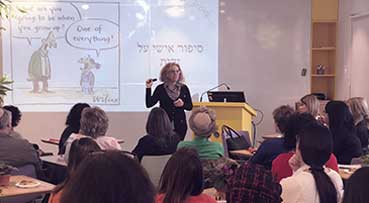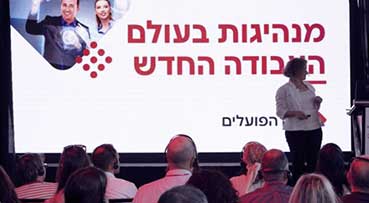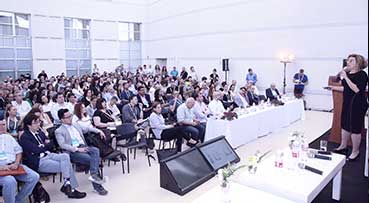Most of your team members are unlikely to independently dive into Gen-AI. Why is that? Comfort often trumps the challenge of learning something new. It demands energy and focus, which can be hard to muster when performance is measured by output, not learning. Who has time for the non-essential? Moreover, embracing new skills means confronting the fear of failure and the daunting thought, “What if I’m not up to the task?” Without your intervention, 2024 will look much the same as 2023 in your workplace.
For us in Israel in Work@War it’s a challenge to focus on anything that isn’t top priority. But unlike the universal pause of the pandemic, the war in Israel challenges only those of us here. And so we must also ensure that our people and our organizations stay current with everything that’s changing. Thus, in 2024, it’s time to shift from discussing Gen-AI to actively engaging with it. It’s essential to empower your team to embrace and utilize these innovative AI tools at every level – individually, as a team, and organization-wide. Traditional learning methods, like those used for teaching tech skills or conducting executive training, fall short when it comes to AI. The rapid pace of AI evolution outstrips conventional educational approaches. Even identifying experts in this field isn’t tied to any standard educational or certification process. Perhaps that’s the crux of it. Gen-AI beckons us to learn through its own offerings – a learning experience that’s not only personalized but self-directed, putting the onus on the learner to take charge.
For years, the mantra of “lifelong learning” and nurturing a learning culture has been echoed, yet its practical implementation often remains elusive. Now, we’re presented with an opportunity that’s actionable and measurable. The key to mastering artificial intelligence lies in cultivating a learning environment that transcends traditional education, preparing us for a future that’s always evolving. Merely learning to use AI tools is not enough; their rapid obsolescence demands a continuous update of skills. Regardless of whether you’re in tech, retail, or services, your 2024 agenda should include a Gen-AI strategy that goes beyond scheduled courses. It’s about developing a workforce equipped with tools to explore multiple dimensions. A workforce that doesn’t just understand these tools but integrates them into their daily routines, always with an eye on emerging innovations. This approach not only fosters growth but also provides a tangible way for your organization to gauge success.
Key indicators to measure the impact of a Gen-AI training program encompass operational efficiency and productivity. This includes quantifiable improvements in time management, error reduction, and the output-to-input ratio. Financial metrics are also crucial, like the cost savings from optimizing current staff roles rather than hiring new personnel, and gains from enhanced customer data accuracy or innovative products. However, the true value of this program transcends these tangible measures. Its most significant effect lies in its ability to transform organizational culture and boost engagement and satisfaction. Employees, liberated from mundane tasks, can focus on creativity and problem-solving. Similarly, customers benefit from interacting with a brand that’s dynamic, evolving, and committed to quality.
The challenge for any organization is communicating the benefits of Gen-AI to its team. It’s a classic chicken-and-egg scenario: people won’t realize the advantages until they’ve had a chance to experience them firsthand. To bridge this gap, a multifaceted strategy is essential for both experimenting with and learning about Gen-AI.
Me and My AI: Building Basic Knowledge
Just as we’ve mastered apps and Google, anyone can learn to use Gen-AI tools. Gradually, these tools will become integral to everyday tasks. They’ll assist in crafting emails, suggest content while drafting reports, summarize meetings, and seamlessly blend into our work routines. As AI grows smarter, those who don’t adapt will find themselves lagging. This necessitates embedding basic training within organizations, ensuring all employees have a fundamental understanding of these tools and are encouraged to experiment, even if it initially slows down their workflow.
A mix of familiar introductory workshops, self-learning online platforms, and expert talks on industry developments and future trends can be effective. However, the crux is teaching individuals to learn through the tools themselves. Gen-AI isn’t just a tool to be learned; it’s a personal tool capable of offering customized learning based on its understanding of both the world and the user. This calls for a rethink in how we approach learning and, more critically, how we integrate its use into our daily work life.
Example in Action: A Weekly AI Challenge – Imagine a scenario where each week, every employee picks a task to accomplish with the help of Gen-AI. Starting with straightforward tasks like drafting emails, data analysis, or information gathering, this approach demystifies the tools, making them both accessible and pertinent to daily tasks. Such hands-on exercises not only make AI tools less intimidating but also spur employees to explore further applications. This method allows them to firsthand experience how AI can streamline their work, and to grasp both its strengths and limitations.
The Team and the Mission: Developing Practical Skills
Ultimately, the objective is to integrate these newfound AI abilities into current roles, delegating tasks to AI that it can proficiently handle, while redirecting team members towards novel challenges. To achieve this, it’s imperative to pinpoint where these tools can be most beneficial within each team and profession. Following this, a process of reengineering the workflow is necessary, tapping into the full potential of AI integration.
Example: Rethinking Mentoring – Here’s some uplifting news: in every organization, perhaps even in each team, there are individuals already delving into and mastering new technologies. This presents a prime opportunity to revamp mentoring processes, promoting both peer-to-peer and cross-generational learning. The concept, previously termed ‘reverse mentoring’ — where younger employees guide more seasoned colleagues — needs a fresh perspective. The term ‘reverse’ implies a one-way flow of knowledge, which is far from the truth. Mentoring should be envisioned as a two-way street, connecting those with knowledge to those who seek it, irrespective of their position, age, tenure, or experience in the organization. Consider creating a reciprocal arrangement. For instance, a younger employee could enlighten a more experienced colleague about Gen-AI, while in return, gaining insights on decision-making and organizational influence. This symbiotic mentoring approach not only narrows the AI skill gap but also cultivates a culture of mutual respect and continuous learning.
The Organization and Leaders: Embracing Cross-Functional Expertise
However, it doesn’t stop there. Technologies like Gen-AI are reshaping traditional structures, deriving value from horizontal, cross-departmental connections. Therefore, it’s highly beneficial to incorporate a cross-organizational training component for leaders who wish to or need to expand their knowledge and specialize further.
Example: Project-Based Learning – This is the perfect opportunity to proactively identify a ‘project bank’ at the heart of the organization, where Gen-AI’s capabilities can be harnessed to tackle real-world challenges. From enhancing customer experiences through AI-driven analytics to streamlining internal processes, the applications are vast. Crucially, these project teams should include individuals with expertise not just in executing tasks, but in ensuring everyone learns to use the tools effectively. Framing these initiatives as ‘learning projects’ rather than just ‘work’ opens the door to breaking down traditional organizational silos and fostering cross-departmental collaboration. Integrating team members from diverse departments not only enriches Gen-AI learning but also brings a variety of perspectives and skills to the table.
Culture: Lifelong Learning
The heart of our journey with Gen-AI lies in fostering a culture where learning is seamlessly woven into the fabric of our work processes. In this environment, skill development becomes as routine as checking emails. It’s a commitment to perpetual growth, ensuring that both individuals and the organization remain at the cutting edge of action and innovation.
Example: “What’s New This Month?” – Imagine setting aside one day each month as an organization-wide learning day, dedicated exclusively to exploring the latest in Gen-AI, and potentially other fields in the future. This isn’t just another day packed with prescribed learning activities. The real beauty lies in its self-directed nature, where individuals from all levels — be it personal, team, or experts — curate the content themselves. A team meeting might focus on sharing new work applications, while experts could lead sessions on novel tools or uses. The essence of this initiative is to pause the regular workflow, dedicating time and attention to learning, making it not just acceptable but an expected part of the organizational culture.
The integration of Gen-AI is set to revolutionize our work methods. For this transition to be successful, it’s crucial to foster a culture and mindset open to these changes. We must cultivate an environment where people not only see the potential in these tools but are also eager to experiment, adapt, invest time, make mistakes, and learn continuously.
Continuing with business as usual is no longer viable, both for individuals and organizations. In 2024, we need to develop a strategy that breaks old habits and forms new ones, ones that effectively merge human effort with Gen-AI tools. These tools should become indispensable in our daily work. By the end of 2025, we should look back and wonder how we ever worked any other way.

![large-AX1A2125-2[1]](https://niritcohen.com/wp-content/uploads/elementor/thumbs/large-AX1A2125-21-pnzedcs72atx5aeurqytqdiihxixlq02re9mlz805s.jpg)






